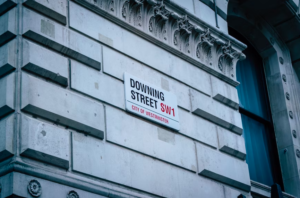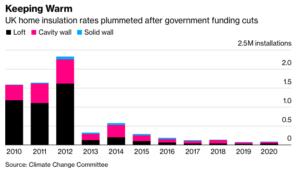As Liz Truss settles in to 10 Downing Street IF’s Digital Campaigns Officer, Liam Hill, considers what is top of the list of priorities for the new Prime Minister, and what ought to be higher on the list.

Energy: the big one
Last week, the government announced a plan to freeze energy bills for consumers and businesses. But the energy crisis is not the only crisis people in the UK are facing. There are multiple other crises the new prime minister and her government must grapple with, for the sake of young people all across the UK.
Cost of living
Even before the recent precipitous rises in Ofgem’s energy price cap, people in the UK have been facing a cost-of-living crisis.
Our research has shown that young people are the most vulnerable in a cost of living crisis: under-35s spend the greatest proportion of their outgoings of any group on essentials; young people have the smallest amount of savings and are least able to survive a 25% drop in their income for three months; and high inflation, and fiscal drag, mean that young people on low and medium incomes, especially those with student loans, are effectively paying tax on more of their income.
With the cost of essentials rising and millions of people of all ages feeling the pinch, radical solutions are required. The government has signalled its willingness to borrow its way out of its problems, and the cost-of-living crisis is undoubtedly one of the most significant short-term problems it faces. Some on the right have suggested exempting young people from income tax altogether. There is no doubt that, even with energy costs capped, the cost of living is going to remain a huge issue and more support from the government will be required.
The housing crisis, and the new “40 over 40”
One essential which is eating up a growing proportion of people’s incomes is housing. The housing-to-earnings ratio in England has doubled over the last 20 years. The proportion of people spending two-fifths or more of their income on housing is now over 40% for under-30s.
What might in previous years might have felt like a London and South East problem has spread rapidly across the country over the past few years, with housing prices rising rapidly beyond London.
Building up and building out
Solutions are required, most notably liberalising planning laws and allowing productive cities to grow beyond their borders. “It’s time to get Britain building,” Truss wrote in a Telegraph article a few days before her victory over Rishi Sunak was announced. One way to do that would be to release some green belt land for development: releasing just 1% of green belt land would create space for 600,000 new homes.
Building more housing upwards is another solution: the most densely populated square kilometre in London is just two-fifths as dense as the densest square kilometre of Barcelona and Paris. British cities are held back by not being able to grow. Whether we’re building up or building out, or both, solving the housing crisis has to be a top priority for the new government.
A cost-of-living emergency for students
Students face the brunt of both the cost of living crisis and the, closely related, housing crisis. There is a scramble for halls, which have been oversubscribed, and some new university students will have to rely on private landlords to find a home. The problem is so bad that Manchester Metropolitan University has offered to pay its new first-year students to live an hour away, in Liverpool or Huddersfield.
We are very close to the beginning of term for many universities across the UK. The government should increase the cost-of-living support offered to all students, ideally through the re-introduction of a maintenance grant or through uprating the maintenance loan with inflation. This is the only way to avoid a dreadful shock for many people starting university as we enter autumn.
Students’ parents are expected to cover the gap between a student maintenance loan (now means-tested) and real living costs. Many families will have to choose between heating their own homes and those of their student children.
The climate in crisis
My colleague Alec Haglund wrote an excellent blog last week on supercharging renewable energy growth in the UK, and the dangers posed by fracking and handing out new contracts to drill oil in the North Sea.
No complacency can be allowed. As well as limiting and phasing out the burning of fossil fuels, this also means not listening to NIMBYs objecting to wind farms or solar panels in their local communities.
Successive governments’ false economies have undermined both the fight against climate change and our resilience to crises like the one we all currently face over energy bills. A good example of this is the huge drop-off in home insulation rates following government cuts. The past decade, with interest rates at record lows, has been a huge missed opportunity to invest in renewable energy and energy-saving technology.

Graph via Bloomberg.
Education and catch up
The government’s investment in catch-up learning, introduced to make up for pupils’ education missed during the pandemic, is also insufficient. Children missing out on education is a crisis for the long term. Failing to deal with this problem will see growing educational inequality translate into greater socio-economic inequality.
The government should digest several Children’s Alliance reports, including this one published last week, all of which contain recommendations on improving the health, happiness and social mobility of children in the UK. To that end, IF also supports their call for the government to appoint a cabinet minister for children.
Growth and its benefits
Liz Truss has spent much of the leadership campaign and her first few days as PM talking about growth, the lack of which constitutes a broader crisis for the British economy. Alongside a looming recession, real wages are forecast to fall to 2003 levels next year: 20 years of no effectively wage growth is no way to be an “aspiration nation”.
Crucially, the benefits of growth must reach young people. Spending over the last decade has skewed decisively towards pensioners, primarily as a result of the triple lock on the state pension and cuts to education spending.
“This is our vital mission to ensure opportunity and prosperity for all people and future generations,” Liz Truss said in her first speech as the new PM on Tuesday. With multiple crises in her in-tray and less than two years until the next general election, she doesn’t have long to make her mark. Like all prime ministers, she will be judged on how she deals with what events throw at her: a decent prime minister can manoeuvre their way through crises, but a great prime minister is one who prevents the crises of tomorrow.
Help us to be able to do more
Now that you’ve reached the end of the article, we want to thank you for being interested in IF’s work standing up for younger and future generations. We’re really proud of what we’ve achieved so far. And with your help we can do much more, so please consider helping to make IF more sustainable. You can do so by following this link: Donate
